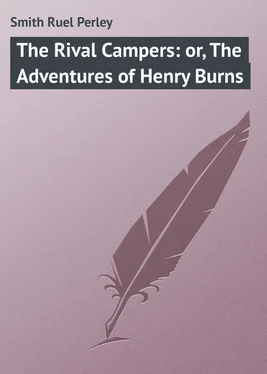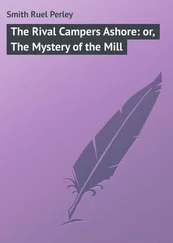Ruel Smith - The Rival Campers - or, The Adventures of Henry Burns
Здесь есть возможность читать онлайн «Ruel Smith - The Rival Campers - or, The Adventures of Henry Burns» — ознакомительный отрывок электронной книги совершенно бесплатно, а после прочтения отрывка купить полную версию. В некоторых случаях можно слушать аудио, скачать через торрент в формате fb2 и присутствует краткое содержание. ISBN: , Жанр: foreign_prose, foreign_children, на английском языке. Описание произведения, (предисловие) а так же отзывы посетителей доступны на портале библиотеки ЛибКат.
- Название:The Rival Campers: or, The Adventures of Henry Burns
- Автор:
- Жанр:
- Год:неизвестен
- ISBN:http://www.gutenberg.org/ebooks/40548
- Рейтинг книги:5 / 5. Голосов: 1
-
Избранное:Добавить в избранное
- Отзывы:
-
Ваша оценка:
- 100
- 1
- 2
- 3
- 4
- 5
The Rival Campers: or, The Adventures of Henry Burns: краткое содержание, описание и аннотация
Предлагаем к чтению аннотацию, описание, краткое содержание или предисловие (зависит от того, что написал сам автор книги «The Rival Campers: or, The Adventures of Henry Burns»). Если вы не нашли необходимую информацию о книге — напишите в комментариях, мы постараемся отыскать её.
The Rival Campers: or, The Adventures of Henry Burns — читать онлайн ознакомительный отрывок
Ниже представлен текст книги, разбитый по страницам. Система сохранения места последней прочитанной страницы, позволяет с удобством читать онлайн бесплатно книгу «The Rival Campers: or, The Adventures of Henry Burns», без необходимости каждый раз заново искать на чём Вы остановились. Поставьте закладку, и сможете в любой момент перейти на страницу, на которой закончили чтение.
Интервал:
Закладка:
But the little yacht had answered her helm well. There was a crash and a splintering of wood, and the yawl drifted rapidly past and was lost in the darkness. The yacht Spray , her bowsprit and fore-rigging torn away, once more fell off the wind and was driven on by the storm. It was an escape so narrow that a moment more and they had been dashed to pieces.
Henry Burns was the first to regain his courage.
“It’s better the bowsprit than the rudder,” he said, coolly. And his courage gave them strength. A few minutes later they had passed the head of the island and gained the lee of the land, and in fifteen minutes more they had cast anchor in Bryant’s Cove.
“I am willing to do whatever you boys think is best,” said George Warren, as they lowered and furled the sail and made the yacht snug for the night. “But I think it’s of no use for us to make any search for the boys along this shore. If they capsized in the bay to-night, neither they nor their canoe would come ashore here. The canoe would be blown across the bay; and they – Well, we’re bound to believe that they didn’t start, or, if they did, that they put back.”
“I don’t see but what we have done all we can to-night,” responded his brother; “and, as we have got five miles of muddy road to travel, the sooner we start the better. We could stay in the boat to-night, but we must get back on mother’s account. Depend upon it, she has worried every single minute we have been gone, and I don’t blame her, either. Now it’s all over, I don’t mind saying I think we were fools to come out. But we meant well, so perhaps the less said the better. We’ll have to leave the Spray to herself till the storm goes down. Nobody will harm her.”
“I don’t mind staying here to-night and looking after her,” said Henry Burns. “To be sure, old Witham doesn’t know I have left the hotel, but I tumbled my bed up before I came away, and he will only think I got up early in the morning, if he wonders where I am.”
“No, no, old fellow. We won’t let you stay. We won’t hear of it,” said both brothers. “The sooner we all get home and get dry clothes on, the better. There’s no need of any of us staying. The Spray won’t sail out of the cove of herself, and every one on the island knows her.”
So, as they had left the tender behind, they removed their clothing, tied it into bundles, slung them around their necks, and, slipping overboard, swam to shore.
“If I ever was more glad to get on land alive than I am at present,” said Henry Burns, his teeth chattering with the cold, as he hastily scrambled into his clothes, “I don’t happen to remember it just at this instant. I wonder if my aunt would send me down here again for my health if she could see me now.”
There was something so ludicrous in the idea that the boys could not help bursting into roars of laughter, – though they felt little enough like merriment.
“The more I think of it,” said Henry Burns, “the more I believe the boys are snug ashore at Millville, and that they haven’t been within ten miles of Grand Island to-night.”
“I think you are right, Henry,” responded Arthur.
“It must be so,” said George.
And yet not one of them dared to believe absolutely that what he said was true.
They started off across lots now, walking as rapidly as their wet and heavy clothing would allow, to strike the road which led to the harbour. Coming at length into this road, they had walked but a short distance, and were at the top of a hill at a turn of the road where it left the shore, when Henry Burns, pointing down along the shore, said:
“We ought to remember that part of the bay as long as we live, for we shall never be much nearer to death than we were right there.”
“Sure enough,” responded Arthur, “it was just about off there that the big yawl smashed our bowsprit off.”
“The yawl must have been driven ashore by this time,” said George. “Wait a minute and I will take a look.” And he disappeared over the bank and was lost in the bushes. The two boys seated themselves by the side of the road to await his return, but started up with a horror in their hearts as a shrill cry came up to them from the shore. There was that in the cry that told them that George Warren had found other than the ship’s long-boat. They scarcely dared to think what. Then they, too, dashed down the slope to the shore.
When they reached his side, George Warren could scarcely speak from emotion.
“Look! Look!” he cried, in a trembling, choking voice, and pointed out upon the beach where the tide had gone down.
There were two strange objects there that the sea had buffeted in its wild play that night, and then, as though grown tired of them, had cast upon the shore, among the rocks and seaweed.
One was the long-boat, no longer an object of danger, for the sea had hurled it against a rock and stove its side in. The other was a canoe. The sea had overturned it and tossed it upon the shore. Two of its thwarts were smashed where it had been dropped down and pinioned upon a rock – and the rock held it fast.
CHAPTER III.
A SURPRISE
With hearts beating quick and hard, they lifted the canoe from the rock, fearful of what they might find beneath it; but there was nothing there. Then they searched along the beach in the darkness as best they could, peering anxiously into clumps of seaweed, and standing now and again fixed with horror as some dim object, cast up by the sea, assumed in shadowy outline the semblance of a human form. The shore was heaped here and there with piles of driftwood and ends of logs that had come down through countless tides and currents from the lumber-mills miles up the river, and this stuff had lodged among the ledges and boulders at various points along the beach. Here and there among these they hunted, groping amid the seaweed, cold and chill to the touch, and suggesting to their minds, already alert with dread, the most gruesome of discoveries which they feared to make.
That the boys had crossed the bay in the frail craft which they had just found there seemed to be no possible doubt. Furthermore, they were now led to believe that Tom and Bob, having once reached a point where they could have found shelter, had chosen to keep on past the head of the island in an effort to make the harbour of Southport. They must at least, as the wind had blown, have reached a point opposite where the boys had found the canoe, and have, perhaps, paddled some distance beyond.
But it was clearly useless to continue the search further in the darkness and storm. They lifted the canoe and carried it up from the beach, and hid it in the bushes upon the bank. Then they went slowly back to the road.
“I tell you what we can do,” said Arthur Warren. “I hate to go back to the cottage without making one more search. Let’s get a lantern and come back. We shall not have to go far for one, – and we shall have done all we can, then, though it is a bad night to see anything.”
The rain was, indeed, pouring in torrents and driving in sheets against their faces.
“Yes, we must do that much,” said George. “And then – then we can come back in the morning – ” His voice choked, and he could not say more. They went on down the muddy road in silence.
Shortly below the hill, upon the road, was a big farmhouse, arriving at which they turned into the yard. The house was in darkness, save one dim light in a chamber; but they pounded at the door with the heavy brass knocker till they heard the shuffling of feet in the entry, and a voice inquired roughly what was wanted. They answered, and the door was opened cautiously a few inches, where it was held fast by a heavy chain. An old man’s face peered out at them. The sight of the boys was evidently reassuring, for, in a moment more, the man threw open the door and invited them to walk in.
Читать дальшеИнтервал:
Закладка:
Похожие книги на «The Rival Campers: or, The Adventures of Henry Burns»
Представляем Вашему вниманию похожие книги на «The Rival Campers: or, The Adventures of Henry Burns» списком для выбора. Мы отобрали схожую по названию и смыслу литературу в надежде предоставить читателям больше вариантов отыскать новые, интересные, ещё непрочитанные произведения.
Обсуждение, отзывы о книге «The Rival Campers: or, The Adventures of Henry Burns» и просто собственные мнения читателей. Оставьте ваши комментарии, напишите, что Вы думаете о произведении, его смысле или главных героях. Укажите что конкретно понравилось, а что нет, и почему Вы так считаете.












